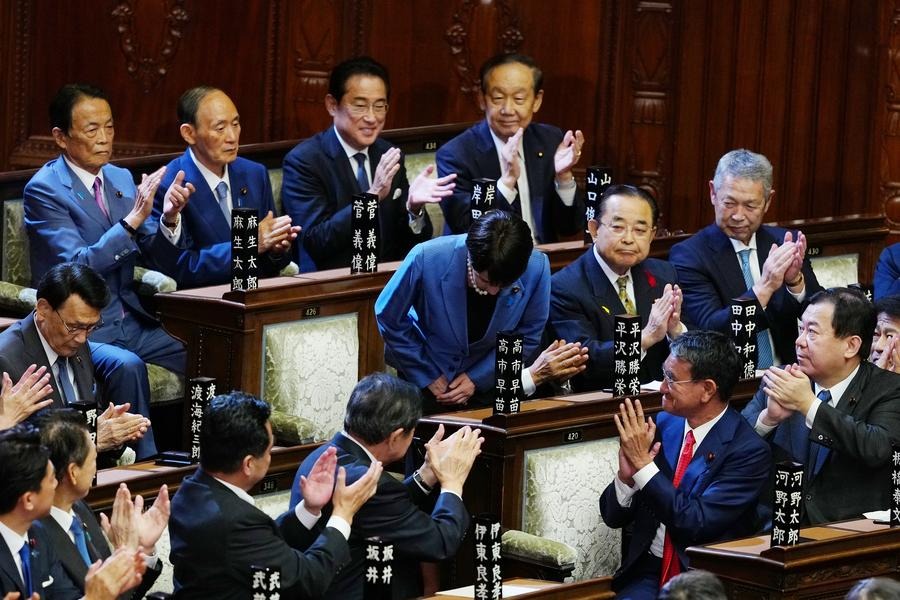Trade facilitation


WANG XIAOYING/CHINA DAILY
China and the US should explore ways to maximize their common interests to advance WTO reform
In early 2023, the Office of the United States Trade Representative submitted to Congress the 2023 Trade Policy Agenda and 2022 Annual Report. Reform of the World Trade Organization was not a priority.
However, unlike the Donald Trump administration, the Joe Biden administration has shown a positive attitude toward WTO reform and it has been collaborating with allies on the issue. It is a sign that the WTO remains an important tool for the US to achieve its trade policy goals.
With a belief that reform of the WTO can be aligned with the needs and interests of the US, the Biden administration views reform of the WTO as an opportunity to target China, its biggest economic competitor.
China is an active participant and advocate of the WTO. It supports developing countries to further integrate into the multilateral trading system and enhance the relevance of the WTO in global economic governance.
While China and the US have key differences on WTO reform, there is still considerable room for cooperation. The two countries should explore ways to maximize their common interests on multiple levels and across a wide range of fields, and jointly address the trade dispute system crisis in the WTO.
The paralysis of the WTO's dispute settlement system remains unresolved. The US proposes that the WTO dispute settlement process should by default be limited to adjudication by panels, while China and the European Union insist on a two-stage arbitration procedure with the Multi-Party Interim Appeal Arrangement
The future negotiations on the dispute settlement system still face great uncertainty. To keep the process functioning, it is necessary to seek the common ground in the proposals of China and the US and find a compromise based on the existing Dispute Settlement Understanding framework, so as to break the negotiation deadlock.
The China Is Not a Developing Country Act, passed by the Biden administration, aims to terminate China's rights in the WTO based on its developing country status. But according to the latest World Bank classification released in 2023, the threshold for high-income economies is $13,845 per capita Gross National Income in 2022, while China's figure was around $12,850. It is a fact that China remains a developing country and it should have the rights as such.
That said, in response to the questioning on classification, China should make Special and Differential Treatment trade-offs based on its current level of development, and actively call on developing member countries to assume obligations in line with their economic capabilities.
Furthermore, the US has specifically mentioned the "disruptive and distorting effects" of China's State-owned enterprise system on the current international trading system, attempting to categorize the SOEs as public entities to accuse them of violating relevant subsidy rules.
To address this issue, China should continue to deepen its SOE reform, differentiate enterprise types based on specific functions, and emphasize the market-oriented nature of the SOEs.
China should also clarify the definition of "public entities" and the legitimacy of specific economic functions of the government, to gain recognition for them from WTO member countries, and promote the establishment of a comprehensive certification system for public entities.
Meanwhile, a joint statement issued by the US, Japan and the European Union has called for enforcing punitive measures for notification and transparency obligations. However, due to differences in development levels, member countries face varying degrees of difficulties in fulfilling transparency obligations. China has explicitly expressed opposition to this proposal and urged developed members to take the lead in fulfilling notification obligations.
In the reform of transparency and notification mechanisms, China and the US should adhere to soft constraints to take full consideration of all member parties, build up the notification capabilities of WTO members, and improve the reverse notification mechanism and the Secretariat report in the Trade Policy Review Mechanism. In this way, overall reform of the transparency mechanism will be achieved through both self-reporting and peer reporting.
In addition, negotiations on the e-commerce agenda need to be advanced. The digital technology revolution has created new forms of international trade, but the development of e-commerce has created concerns about data security and cybersecurity.
At the 12th WTO ministerial conference, China and the US reached an agreement on not imposing custom duties on electronic transmissions. In the future, the two countries can continue to promote e-commerce cooperation in areas such as facilitating cross-border e-commerce, electronic authentication, online consumer protection and data security.
At the same time, China and the US need to recognize the inequality in digital trade development among the different members of the WTO, respect the interests and demands of each member economy in the field of e-commerce, and provide technological assistance to developing economies, especially the least developed ones.
The Biden administration sees trade as a crucial tool for addressing the climate crisis and promoting environmental sustainability. China has also proposed and implemented initiatives such as plastic pollution control actions.
At the 12th WTO ministerial conference, China and the US accepted the Agreement on Fisheries Subsidies, the WTO's first-ever multilateral trade agreement with the environment at its core.
China and the US should continue to jointly promote the formulation of rules in trade and environmental sustainability, facilitate the movement of climate-friendly goods, provide technical support for clean energy infrastructure to the least developed members, and collaborate in protecting marine ecosystems.
Yu Zhen is director of the Institute for the US and Canadian Economies of Wuhan University. Zheng Mengting is a research assistant at the institute. The authors contributed this article to China Watch, a think tank powered by China Daily.The views do not necessarily reflect those of China Daily.
Contact the editor at editor@chinawatch.cn


































